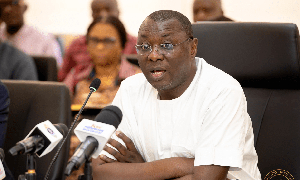
According to a recent research report by IMANI Ghana, the Ministry of Finance is the most fiscally reckless of all Ministries, Departments, and Agencies (MDAs) between 2015 and 2023.
The report focuses on the Ministry's recurring budget overruns, excessive borrowing, and mishandling of public finances during the time under consideration.
According to IMANI's conclusions, Ghana's weak fiscal discipline has contributed to mounting debt and economic instability.
“The Ministry of Finance tops the list of MDAs as the most fiscally reckless institution between 2021 and 2023. The Ministry of Finance recorded an FRI score of 0.9038, which translates to about 90 per cent of financial infractions traced to the Ministry of Finance. The Ministry of Finance is followed by the Ministry of Communication, the Ministry of Roads and Highways, the Ministry of Health, and the Ministry of Food and Agriculture as the top five fiscally reckless institutions for the period of assessment,” a Senior Research Associate at IMANI Centre for Policy and Education, Dennis Asare said.
Mr Asare disclosed this at an event to disseminate the findings of the report to stakeholders on October 23, 2024.
A new report by IMANI Ghana has revealed that financial irregularities by Ministries, Departments, and Agencies (MDAs) between 2021 and 2023 are estimated to have reached GHC4.89 billion. This figure is almost ten times the cost of the Livelihood Empowerment Against Poverty (LEAP) programme in 2023.
While the report highlights a significant reduction in financial irregularities compared to the GHC13.94 billion recorded between 2015 and 2020, it also notes a concerning increase in financial irregularities linked to taxes during the 2021–2023 period.
In light of the current economic challenges facing the country, IMANI emphasized the need for urgent action, stating, "Plugging the leakages has become increasingly important considering the current macroeconomic circumstances."
However, during a discussion of the report, a participant raised concerns about the possibility of some of the highlighted irregularities being addressed after the fact. He suggested that IMANI should undertake a follow-up study to ascertain whether these financial shortfalls have been resolved, adding that failure to do so would be unfair to the Ministry of Finance.
The IMANI Ghana report has sparked renewed conversations on the need for stricter financial oversight within government institutions as the country grapples with its economic situation.